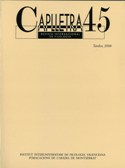La voluntat de comunicar com a objecte primordial en l'aprenentatge d'una L2
DOI:
https://doi.org/10.7203/caplletra.45.4795Paraules clau:
learning goals, second language, language contact, attitudes, prejudices, motivations, willingness to communicate, communicative competence, communicative behaviour, communicative confidence, teacher training, educational policies, linguistic centre proje Resum
Resum
Although evidence has shown that psychosocial factors have a decisive influence in second language learning, it has not been highlighted the importance they have regarding educational practice, the design of learning programs or teacher training.
The model known as Willingness to Communicate, developed by MacIntyre et al. (1998) from numerous empirical works, points at the factors that favor authentic use in the learning of a second language and the relationships among them. The goal of
a language course can not be limited to developing communicative competence but has to be aimed at increasing the willingness to communicate actively. Following this theoretical model, one of its authors, Zoltán Dörnyei (2001), has devoted one of his books to the development of practical strategies of motivation in the language classroom. These approaches are specially useful for contexts of linguistic concurrence like ours, especially at a moment in which school multilingualism is promoted.
 Descàrregues
Descàrregues
Descàrregues
Publicades
Com citar
-
Resum366
-
PDF196
Número
Secció
Llicència
L’autor o autora que adrece un treball a la redacció de Caplletra perquè siga publicat ha de ser la persona titular legítima dels drets d'explotació. La legitimació per a la publicació del treball ha d’incloure també les imatges, les taules, els gràfics i altres materials que puguen complementar el text, amb independència de si n'és l'autor o autora.
Copyright. Quan publica el treball en la revista, l'autor o autora cedeix a Caplletra. Revista Internacional de Filologia els drets d'explotació (reproducció, distribució i comunicació pública), tant per a l'edició impresa en paper com per a la versió electrònica, que serà accessible mitjançant la xarxa Internet.
Tots els treballs publicats en Caplletra es troben sota una llicència Creative Commons del tipus Reconeixement-NoComercial-SenseObraDerivada 4.0.
RESPONSABILITAT
Caplletra. Revista Internacional de Filologia no s'identifica necessàriament amb els punts de vista mantinguts en els treballs que publica.
Caplletra. Revista Internacional de Filologia declina tota responsabilitat derivada de qualsevol vulneració eventual dels drets de propietat intel·lectual que poguera ser duta a terme pels autors o autores.






